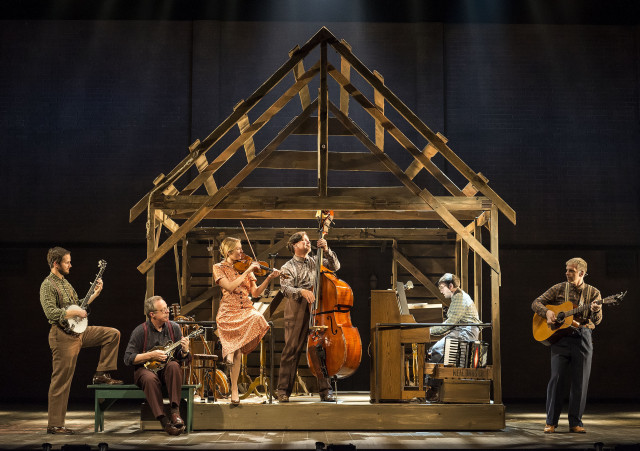
With claims of being “inspired by real events,” and with fine direction from Walter Bobbie, the current Theater Under the Stars production of the Broadway musical, Bright Star, has no shortage of charms. A delightful collaboration of music and story by Steve Martin & Edie Brickell, the show has a compelling book by Mr. Martin and pleasant lyrics from songwriter, Brickell. While neither of them performs in the show, he is well known for his skill on the banjo, so it is no surprise that the musical score for this sometimes dramatic piece of theatre has a sweet, bluegrass flavor, supported by a wonderful onstage band with musical direction from P. Jason Yarcho. The sometimes tricky plot has unexpected twists and turns that are occasionally disturbing, but take heart. As Shakespeare reminded us, “All’s well that ends well.” We first find ourselves in North Carolina’s Blue Ridge Mountains during the post-war period of the mid 1940’s. Alice (Audrey Cardwell) works as an editor of other people’s stories, but in the opening number she alerts the audience that she has a story of her own to tell. Cardwell brings a lovely and lilting voice to “If You Knew My Story,” and the fine cast ensemble joins in for the building excitement of the song’s crescendo. That very talented ensemble takes on, in my opinion, a really starring role in this production. Those players drift gently in, out and around virtually every scene. They sing, dance, move set pieces for scene changes, and are an ever-present and ever-changing force that is never intrusive on the central action of the play (choreographer Josh Rhodes). One feature of this tale requiring careful audience attention is the use of flashbacks in time as Alice’s tale unfolds. We meet a handsome young returning soldier (and aspiring writer) named Billy, appealingly played by Henry Gottfried. When Billy arrives back at his family’s mountain cabin, he sadly learns from his Daddy (David Atkinson) that his mother has died while he was at war. The two sing a poignant and wailing duet of the touching, “She’s Gone.” As things proceed from scene to scene, the set pieces glide and whirl across the stage, sometimes with the graceful aid of the aforementioned ensemble, thus revealing each new setting, courtesy of scenery by Eugene Lee, shadowy lighting by Japhy Weidman, and pleasant country costumes by Jane Greenwood). Our young veteran reunites with his childhood friend, the lovely Margot (Liana Hunt), and while singing the show’s optimistic title song, he delights her with the news he is planning to seek publication of one of his original stories in the area newspaper. Soon after, he visits the office of the Asheville Southern Journal where he first meets the amusing office workers, Lucy (Kaitlyn Davidson) and zany Daryl (Jeff Blumenkrantz of the original Broadway cast). While Daryl and Lucy are dismissive of Billy’s stories, he finally meets Alice, the straight-laced and aloof editor who is intrigued by his bravado and bluster in putting himself forward as associated with some famous literary figures. She reminisces about her carefree youth and boyfriend, Jimmy Ray (Patrick Cummings) with the whimsical song, “Back in the Day,” As the ensemble players float about decorating the scene like barely visible phantoms, we suddenly see Alice transformed from stuffy and serious to young and gay. When the flashback time machine of the show goes into effect we find ourselves back in the 1923 of Alice’s younger self, where Jimmy Ray courts her with the lusty and toe-tapping tune, “Whoa, Mama.” The pair’s parents reject this romance, especially Jimmy Ray’s pompous father, Josiah, the town Mayor (Jeff Austin), but a one night stand by the riverbank results in an out-of-wedlock pregnancy and leaves the perception of tragedy in the air at the end of Act One. I hesitate to give details of the second act, because for me, the unexpected plot twists that ultimately turn things around to bring us a very satisfying conclusion are an important part of this surprising story. But through all of the story’s ups and downs, this exceptional 10-piece, onstage band not only performed the appealing score beautifully, but happily had a special place in the spotlight for the “Entr’acte” music that begins Act Two. Bravo to all!
